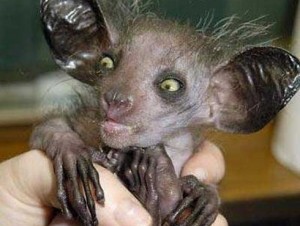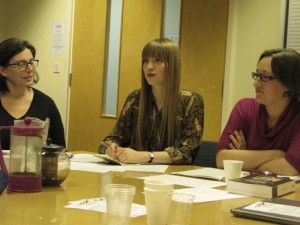by Clémentine
A long time ago I was an exemplary (i.e. completely stressed-out) student at the prestigious Lycée Henri-IV
in Paris, and I hated it. Desperate to escape the constant
humiliations, threats, existential worries and intellectual rigidity
imparted by the French university system, I ended up setting up my own wicker-basket-business backpacking up Mount Annapurna becoming a horse-whisperer studying at Cambridge. Ironic, I know, but happiness levels rocketed.

- Me, before moving to the UK.
Anyway,
as a result of adolescent trauma, until very recently I'd never really
tried to get in touch with French researchers in children's literature,
even though I use a ton of French philosophers in my own work. There's
so much research in English already, and so little time, and of course I
suspected that it would be done quite differently across the Channel.
But last year, as I was browsing the Internet, I stumbled upon the blog of children's literature lecturer and researcher Cécile Boulaire,
from the University François-Rabelais of Tours. I left a comment, and
got an email in return. Our correspondence resulted in my inviting her,
and other French researchers, to a day symposium at our Research Centre in Cambridge. The symposium took place last week.
Our five guests were members of the Afreloce (French
Association for Research on Books and Cultural Objects pertaining to
Childhood): Cécile Boulaire, Laurence Chaffin, Matthieu Letourneux,
Mathilde Lévêque and Christophe Meunier. They happened to be much less terrifying than my past teachers.

- Me, not terrified.
The
main purpose of the symposium was to present and compare theoretical
perspectives and methodologies in children's literature research in
France and in English-speaking countries. The programme was as follows:
Current Francophone and Anglo-American Research
in Children’s and Young Adult Literature
Session 1. History and the Children’s Book.
9.30-10.00. Kate Wakely-Mulroney (University of Cambridge)
· The conventions of nonsense in Charles Dodgson's correspondence.
10.00-10.30. Laurence Chaffin (University of Caen)
· Literature for girls in the 19th century.
Session 2. Geographies of Childhood and Adolescence.
11.00-11.30. Erin Spring (University of Cambridge)
· Answering ‘Who am I?’ by asking ‘Where am I from?’: Constructions of place-based identity through young adult fiction.
11.30-12.00. Christophe Meunier (Ecole Normale Supérieure, Lyon)
· Children’s picturebooks : actors of spatiality, generators of spaces.
Session 3. Reading Words and Pictures.
13.30-14.00.Cécile Boulaire (University François Rabelais, Tours)
· Poetics of picturebooks.
14.00-14.30. Yi-Shan Tsai (University of Cambridge)
· Young readers' critical responses to manga.
Session 4. New Theoretical Perspectives and Territories of Research
14.30-15.00. Professor Maria Nikolajeva (University of Cambridge)
· Memory of the present: empathy and identity in young adult fiction.
15.00-15.30. Matthieu Letourneux (University Paris Ouest/ Nanterre)
· Youth literature: series logic and cultural series.
15.30-16.00. Clémentine Beauvais (University of Cambridge)
· Desire and didacticism in the children’s book.
16.30-17.30. Round Table. Chair: Clémentine Beauvais.
· National and International Trends in Children’s Literature Research.
The
day, and especially the round table at the end (which was square, as an
unplanned tribute to Descartes) confirmed some of my assumptions and
invalidated others concerning the differences between children's
literature studies in France and in the UK/US. Here's a quick overview:
- Children's literature research in English-speaking countries is much more driven by power theory.
The children's book is perceived as a space of adult (and sometimes
child) powers - indeed it is the object of my thesis. In France, as
Cécile and Matthieu confirmed, it isn't a recurring question at all.
Paradoxical, of course, since it's a very Foucauldian analysis. Which
brings me to my next point...
- The French don't do 'French Theory'.
Foucault is apparently studied quite a bit still, but Deleuze, Derrida,
Kristeva, Bourdieu and all the thinkers cheerfully grouped under the
magic 'French Theory' umbrella by anglophone researchers seem to be much
more rarely found in France than abroad.
- French researchers study children's literature mostly 'as literature.'
I know this may sound very strange, but it's far from being always the
case here. Personally, I don't see myself as studying children's
literature as literature. The child in the book isn't necessarily the
focus for French researchers- aesthetic criticism of children's books
'as literature', 'as works of art', regardless of the audience, seems to
be prominent.
- The Anglo-Saxon approach seems currently more theoretical, the French one more aesthetic and historicist.
Of course, this has to be nuanced to a great deal - a lot of UK/US
researchers do historical criticism. But the theoretical effort which
underscores current publications in English - definitions, axioms,
'towards a theory of children's literature', etc - doesn't seem to have a
French equivalent. This is counterbalanced by a very high level of
detail, in French research, of aesthetic analyses and of
contextualisation.
- But we also have a lot in common.
As one of the sessions (on geography/ecocriticism in children's books)
showed, emerging fields of research are concomitant in both 'bubbles'.
And we're asking the same questions - how do picturebooks work? What's a
children's series, and what can it tell us about the sociocultural
contexts of its creation and distribution? And of course, what is
children's literature?
But a haunting question remains, one which Maria Nikolajeva develops on her blog:
what can we do to develop research partnerships, to overcome the
language barrier, to be aware of what other research centres abroad are
doing? The Internet helps, but without regular and sustained
interaction between different countries we might be condemned, in the
Arts & Humanities, to reinventing the wheel terrifyingly often.
For French-speakers: Mathilde Lévêque wrote a blog post on this symposium, and so did Cécile Boulaire.
Note: I'm very grateful to the Research Centre and to Christ's College for funding this event.
Labels: children's literature, conference, sharing research